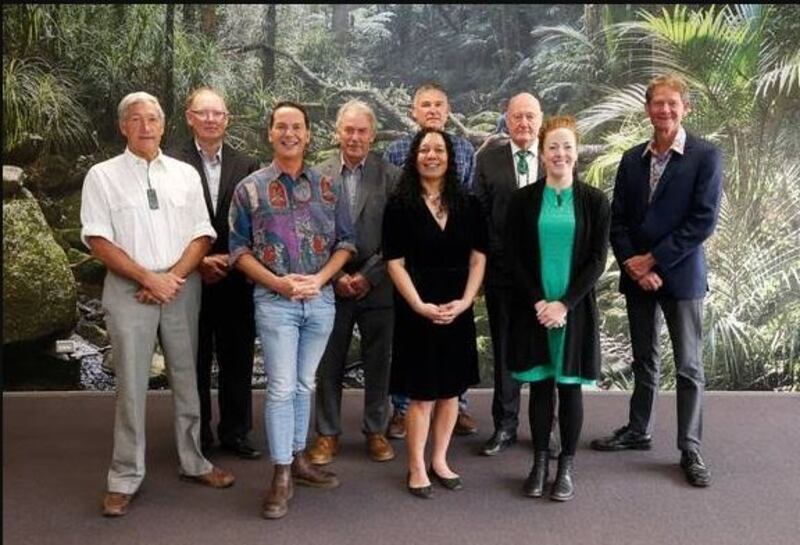Opinion
Tui Shortland (Ngāti Hine, Ngātiwai, Ngāti Raukawa, Te Rarawa) has resigned from her role as chair of Northland Regional Council (NRC), a year into the job. She was the first wahine Māori to be elected as a regional council chair. Despite stepping down, she has told Tautīnei that she will remain within NRC.
Regional council chairs are selected differently from district council mayors, who stand for that position and are elected directly to that role by the public. In contrast, regional council chairs are chosen from successfully elected councillors.
Shortland was selected by her fellow politicians to the top job soon after October 2022′s local government elections.
The NRC plays an important role in the Far North district by managing regional resources, such as water and land use, and addressing environmental issues.
It works on regional planning, monitoring, and promoting sustainable development. The council also collaborates with local authorities, including the Far North District Council, to address shared challenges and enhance the overall well-being of the region.
Northland Regional Council often collaborates with iwi through various mechanisms such as formal partnerships, consultation processes, and joint decision-making forums. This collaboration aims to incorporate Māori perspectives, mātauranga Māori and the principles of Te Tiriti o Waitangi into the council’s policies and decision-making processes.
Stronger Māori perspectives
The specific details of collaboration can vary but it generally involves ongoing communication, engagement, and mutual understanding to address environmental and resource management issues in a way that respects and integrates Māori cultural values.
The introduction of Māori councillors across the Far Northern district was one of these mechanisms to implement stronger Māori perspectives across their organisational structure.
Shortland was a first-time councillor when she became chair, after being elected to NRC from its first-time, region-wide Māori constituency Te Raki Māori constituency. She helmed the nine-person NRC council (including her role) and organisation with 285 staff, a $76.9m operational budget and $14.963 million capital spend with rates on 100,000 rateable properties across almost 14,000 square kilometres.
Shortland was nominated for the top job by Councillors Rick Stolwerk and Peter-Lucas Jones (Te Aupōuri, Ngāi Takoto). At the time of her selection at the inaugural meeting of the new 2022-2025 council in October 2022, Shortland expressed excitement. At her selection, fellow constituency representative Peter-Lucas Jones said Shortland, importantly, had been supported in her development towards her new NRC leadership role by kaumātua and the marae of Te Tai Tokerau.

Shortland spoke to Te Hiku Media after a pōwhiri that was held for her and elected councillor Peter-Lucas Jones at Te Puna o te Mātauranga Marae in Raumanga.
Both councillors were elected in the Te Raki Māori constituency for the first time in history of Māori wards in Te Taitokerau.
With a busy schedule, supporting many important kaupapa Māori within the region and beyond, Tautīnei was curious if she had any magical powers that we didn’t know about.
She replied with a laugh: “Sleep is my superpower.”
Tautīnei then wondered who her key guiding kaumātua were growing up;
“Kevin Prime, Tohe Ashby and Hori Parata were some of my key guiding elders.”
With ambition built by role models like the above, fire in her belly to ensure Māori have a voice in the spaces that matter and the drive to bring these visions to life, it is a huge relief that she will still be sticking around and not leaving NRC completely.
Shortland’s resignation will be effective from NRC’s November 28 council meeting. No reasons for her departure from the role have been given.
She told Tautīnei ,“I ran on water. Water was one of my drivers for running (for Northland Regional Council).
" I wrote the stage one report for Te Mana o Te Wai mō Te Taitokerau, I proposed an emancipated water system where traditional knowledge is at the forefront and I was concerned about whether or not that would fully go through the freshwater plan change, which is coming up within this term we are sitting, and that’s what motivated me to run for council because I know it is the councillors who ultimately will decide what the policies say”.
Jones said,“As an institution, the council, as a system of power has historically marginalised Māori and played a role in the alienation of whānau from their lands. One of the things I want to do is ensure our whanau and hapu and iwi voice, has a place - now and in the future, at the council table...It’s an absolute honour to be voted in to this position and it’s absolutely huge mahi”.
- Te Hiku Media

